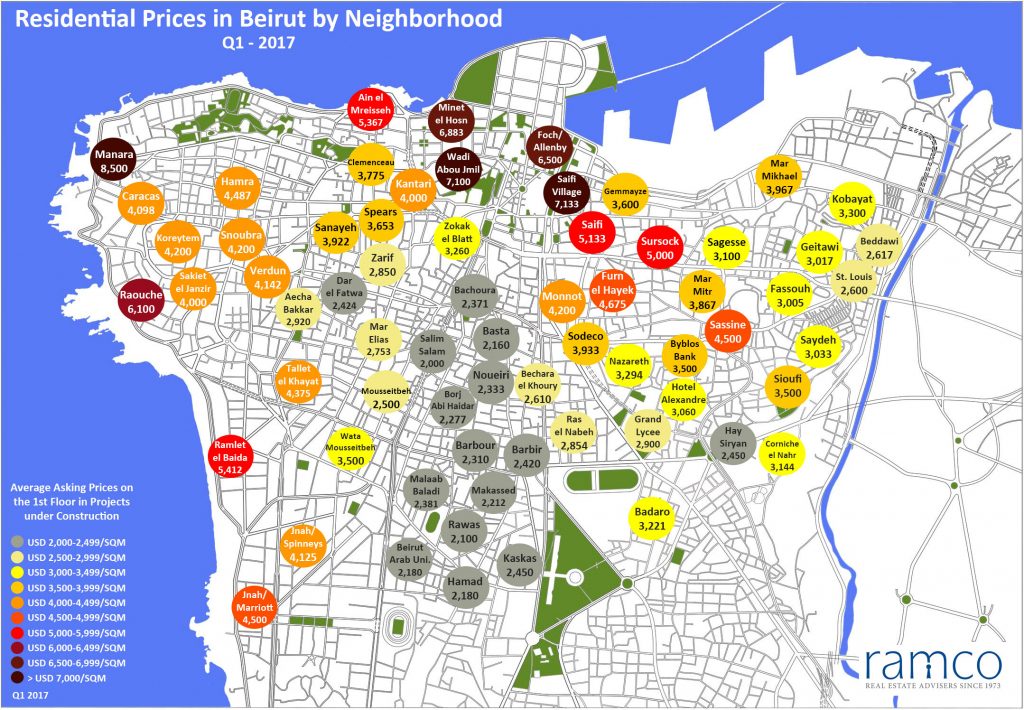by Alanna Martinez • Observer.com – A private art organization in Beirut has big plans for the city’s downtown: Come 2020, the area will become home to the city’s largest art museum. The Ramzi and Saeda Dalloul Art Foundation has announced plans to build a 10,000- to 15,000-square-meter institution to house its 4,000-piece Modern and […]
by lebaneseexaminer.com = The average starting cost for apartments under construction in Beirut vary from $2,000 to $8,500 per square meter, according to a new study conducted by a Beirut-based real estate advisory firm. The firm RAMCO studied apartment asking prices in 67 Beirut neighborhoods, including popular downtown districts such as Saifi Village and Manara. According to the study, between 2016 and 2017, prices have dropped in 34 out of the 67 Beirut neighborhoods, especially in central neighborhoods between Bachoura and Kaskas. But researchers say there has not been a significant drop in apartment prices in the highest tier of the market. The most expensive neighborhoods, Manara and Saifi Village, have the same asking price as last year.
SEE MAP OF BEIRUT’S MOST EXPENSIVE NEIGHBORHOODS:
The Daily Star BEIRUT: Prime Minister Saad Hariri Monday began his U.S. visit by meeting several senior U.S. officials and politicians to discuss Lebanese and regional matters ahead of his meeting with President Donald Trump later this week. According to a statement from the PM’s media office, Hariri met with Chris Brose, Staff Director at the […]
BEIRUT, July 24 (Xinhua) — The families of nine Lebanese servicemen being held hostage by Islamic State (IS) have expressed concerns over the fate of their sons, local LBCI TV reported. Hussein Youssef, the father of captive soldier Mohammed Youssef, said in an interview with LBCI that he was worried about his son, after Hezbollah […]
by Christopher Woody –Amid ISIS’ defeat in the Iraqi city of Mosul and ongoing fighting in its self-declared capital in Raqqa, Syria, the fate of its leader, Abu Bark al Baghdadi, remains unknown. Russia said in late June that it believed he had been killed in a bombing raid on Raqqa, but earlier this week […]
by catholicherald.co.uk – A Catholic charity has sent 15 statues of the Virgin Mary to the Middle East to replace ones destroyed by ISIS. The group Œuvre d’Orient, a French association dedicated to helping persecuted Christians, has sent the statues from Lourdes to Ankawa, a suburb of the city of Erbil in Iraqi Kurdistan, which […]
By AFP – US President Donald Trump will meet Lebanese Prime Minister Saad Hariri in Washington next week for talks on issues including refugees and combatting terrorism, the White House announced Friday. Analysts also anticipate US aid will be high on the agenda of the July 25th talks at the White House, which has made […]
by Associated Press – The Syrian army and members of Lebanon’s militant Hezbollah group launched a major ground offensive on Friday aimed at ending the years-long presence of hundreds of militants in a border area between the two countries. The offensive was widely expected after negotiations with militants to leave the area failed over the […]
by english.aawsat.com – Fatah Al-Rahman Youssef Riyadh- The Lebanese Labor and Investment Council in Saudi Arabia =said it was looking forward to increasing investment partnerships between Riyadh and Beirut in the sectors of health, services, petrochemicals, industry, leisure and tourism. It added that the resumption of “Flynass” flights to Beirut would enable the business sector […]
Our prayers with Nizar Zakkar BEIRUT (AP) ” The family of a Lebanese man with U.S. permanent residency who has been held in Iran for nearly two years says his condition is deteriorating three weeks after starting a hunger strike. The brother of Nizar Zakka, who went missing on Sept. 18, 2015, during his fifth […]




